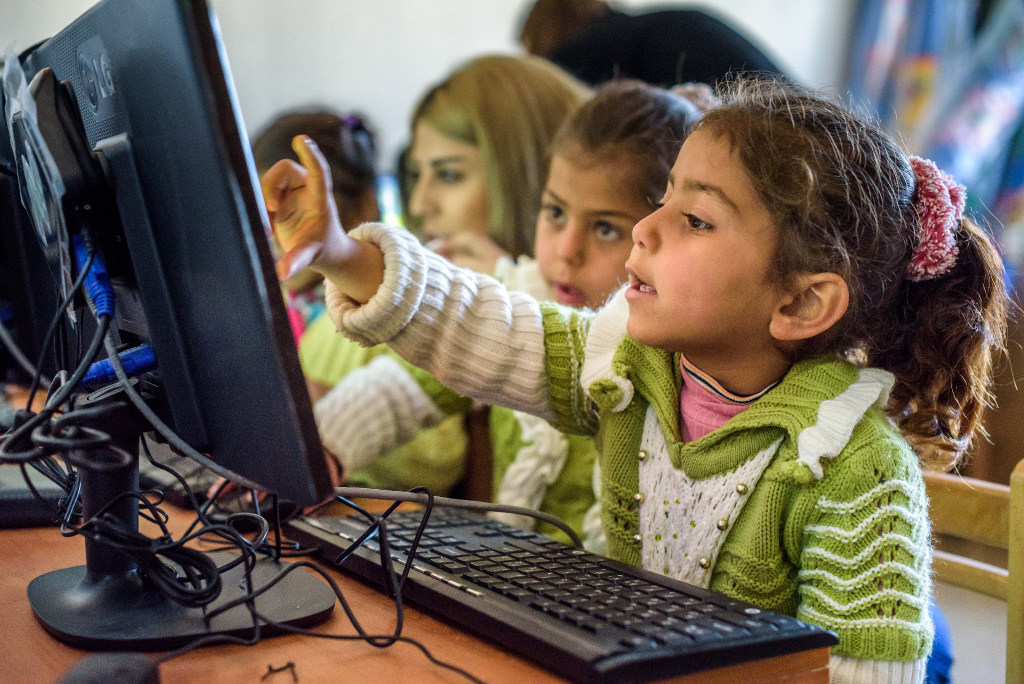Facebook, Google join World Vision to combat Syrian refugee education crisis
Friday, March 3, 2017

Tech giants Facebook and Google have joined forces with World Vision, the largest global humanitarian agency, to thrash out digital solutions to the education crisis facing more than 6 million displaced Syrian children.
Over the past two days at a summit in Jordan this week, Microsoft, Nethope, Cisco Facebook and Google and other big tech companies, have rolled out their ideas on how technology can be used to bring learning to these children.
The No Lost Generation (NLG) Ed Tech summit is a unique event which has come up with some truly innovative solutions, World Vision Australia CEO Claire Rogers said.
“We are looking at the use of mobile apps, video learning, tablet based literacy tools, online courses, educational games, remote teacher-training, online assessments and teacher monitoring tools for Syrian refugee children,” Ms Rogers said.
“Their homes and schools may have been destroyed -- but technology may be the gateway that lets Syrian children catch up on years of lost schooling!”
All education gains made in the past ten years in Syria and neighbouring countries have effectively been wiped out, according to the UN. One in three schools in Syria have been damaged.
“With 1.7 million children inside Syria are out of school, a further 1.3 million inside Syria at risk of dropping out, and 3 million children out of school last year in Iraq, this is an education crisis,” Ms Rogers said.
“Children want to learn, but can’t because their schools have been bombed, their lives uprooted, and their chances in life potentially shattered as a result.”
Watch the story of Mohammed, a young Syrian who hopes to be a journalist. Instead of editing a school newspaper he is starting a magazine in Azraq refugee camp. He hopes to shed light on what children have experienced: Syrian refugee starts his own newspaper
In 2017, the No Lost Generation – a consortium of NGOs led by World Vision's Mark Chapple tasked with boosting education for refugees – is preparing to reach 1.3million children inside Syria, and the same number outside the country.
“Over the past two days, we’ve heard bright and bold ideas from some of the biggest brains in technology,” Mr Chapple, who spearheaded the EdTech summit, said.
“We’ve harnessed the talent and, through this summit, donors have given their backing with seed-funding.”
Mr Chapple said that these projects will become a reality for refugees who are simply striving to catch up on their education – but can’t because they no longer have access to a traditional classroom.
“We’ve been hearing from refugees themselves at this event, and we know education is a priority for children and their families. Over in Lebanon I met parents from Syria who were skipping a meal each day so they could afford the bus fare to send their children to school,” Mr Chapple said.
“More than half of children who fled Syria aren’t in school, so we need to act swiftly to make sure we don’t end up with an entire generation who lose out in the future through no fault of their own.”
Mr Chapple said every child had the right to an education. “And we know that without education societies become more violent, more divided, less prosperous and less equal.
“Syrian children deserve to be able to access quality education wherever they are, so that they can be the driving force behind the rebuilding of a peaceful Syria.”
The summit is outcome focused and is offering seed-funding grants of $50,000 to selected ideas developed at the event.
World Vision, working with the Digital Opportunity Trust Lebanon and Lebanese Alternative Learning Alliance, has already pioneered the Tabhoura e-learning programme for three to six year olds. Using Moodle e-platform technology they have digitised the Lebanese school curriculum. A total of 2,350 educational activities includes rhymes, short movies and flip books that can be accessed in Arabic, French and English for free.
Countries hosting vast numbers of refugees, like Lebanon and Jordan, lack the capacity to absorb thousands of refugee children into their state school system. World Vision believes that these e-learning platforms can help bridge the gap.
“Two of the defining stories of our age are digital transformation and the world-wide refugee crisis, and at this summit, they meet,” Ms Rogers said. “I find these moments where innovation meets social good very exciting.”
For further information please contact Leah Swann at 0421 857 591
Media Releases,
Middle East, Eastern Europe & Central Asia,
Child literacy,
Claire Rogers,
Education,
Google,
innovation,
Jordan,
Literacy,
Microsoft,
Syria,
World Vision
Back to all Results